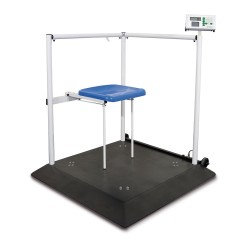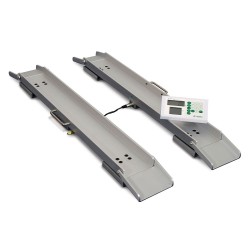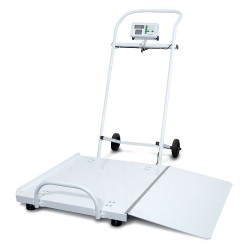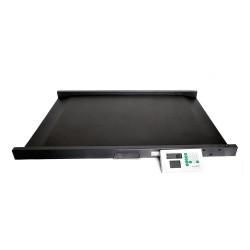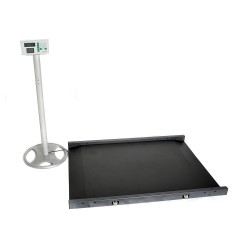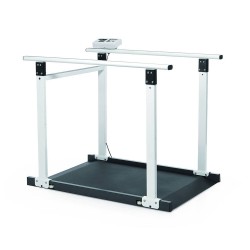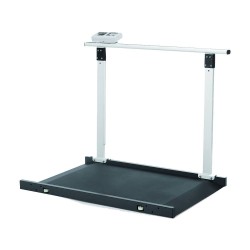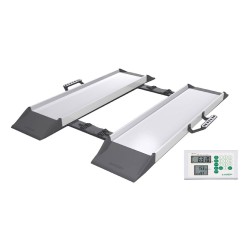Medical Wheelchair Scales
There are 8 products.
Active filters
About Medical Wheelchair Scales
Accessible Weighing for Wheelchair Users Without Transfers
Medical wheelchair scales provide essential accessible weighing solutions for wheelchair users, enabling accurate weight measurement without requiring patients to transfer from their wheelchairs, serving hospitals, rehabilitation centres, care facilities, and clinics throughout England, Scotland, Wales, and Northern Ireland. These specialised weighing platforms feature low-profile ramps enabling easy wheelchair access, large platform surfaces accommodating wheelchairs safely, accurate weighing mechanisms compensating for wheelchair weight, and appropriate capacities supporting bariatric wheelchair users. Healthcare environments rely on wheelchair scales for weighing permanent wheelchair users requiring regular monitoring, patients temporarily using wheelchairs during recovery, individuals with spinal injuries unable to stand or transfer safely, bariatric patients using specialised wheelchairs, and elderly patients with limited mobility safer remaining seated. Modern medical wheelchair scales incorporate features including gentle ramps with suitable gradients, tare functions deducting known wheelchair weights, clear displays readable from wheelchair height, and robust construction withstanding repeated wheelchair use. The provision of wheelchair scales demonstrates commitment to accessible healthcare, eliminates discrimination by ensuring all patients can be weighed regardless of mobility, and supports patient safety by preventing risky transfers solely for weighing purposes across professional healthcare environments.
The implementation of medical wheelchair scales directly supports CQC compliance through accessible patient care meeting disability equality requirements, enhanced safety through elimination of unnecessary transfers, and demonstration of appropriate equipment provision serving diverse patient populations. Wheelchair users traditionally face significant barriers to routine weighing, with conventional scales requiring standing or transfer to chair scales, either of which may be impossible for permanent wheelchair users or risky for those with temporary mobility limitations. Medical wheelchair scales address accessibility barriers by enabling weighing whilst seated in familiar mobility equipment, eliminate transfer risks for patients with spinal injuries or severe mobility impairments, support dignified care through independent weighing without requiring assistance for transfers, and deliver accurate weights supporting clinical decisions. Clinical applications include spinal injury rehabilitation monitoring body composition changes, bariatric care tracking weight management progress, chronic disease management monitoring conditions affecting weight, medication management requiring accurate dosing calculations, and routine health surveillance ensuring wheelchair users receive equivalent monitoring to ambulant patients. Healthcare organisations benefit from reduced transfer-related incidents when wheelchair weighing eliminates unnecessary movement, improved health equity through accessible weight monitoring for all patients, and enhanced efficiency through quick weighing procedures. Modern wheelchair scales incorporate safety features including non-slip ramp surfaces, secure platform edges preventing wheelchairs rolling off, and stable construction throughout England, Scotland, Wales, and Northern Ireland.
Selecting and implementing medical wheelchair scales requires assessment of patient populations, appropriate equipment specification, and integration with clinical protocols across healthcare facilities throughout the UK. Organisations should evaluate the proportion of wheelchair-using patients requiring weighing, determining whether dedicated wheelchair scales in specific areas or portable systems prove more appropriate, assess clinical requirements identifying necessary accuracy and capacity, and consider practical factors including space availability, ramp storage when folding designs are used, and staff training requirements. Equipment selection should prioritise medical device certified scales meeting accuracy standards, appropriate capacity typically 300-400kg accommodating bariatric wheelchair users, platform dimensions ensuring most wheelchair types fit safely, and ramp designs with suitable gradients enabling independent access where possible. Implementation protocols must encompass staff training on scale operation including proper wheelchair positioning, tare procedures for known wheelchair weights or weighing empty wheelchairs first, and safety supervision for less stable patients. Quality assurance measures should include regular calibration maintaining accuracy, documented verification of tare weights for facility wheelchairs, cleaning protocols for equipment contacted by multiple users, and monitoring of weighing-related incidents. Modern wheelchair scales incorporate features such as foldable ramps simplifying storage, handrails providing additional support, and wireless connectivity transferring weights to records. Organisations should establish protocols identifying which patients benefit from wheelchair scale use, maintain records of facility wheelchair weights enabling accurate taring, and train staff on assisting wheelchair users onto platforms safely. Clinical teams should consider specific populations including bariatric patients requiring high-capacity equipment, users of powered wheelchairs with substantial equipment weight, and patients in specialised seating requiring very large platforms. Accessibility considerations should include positioning scales in convenient locations, providing clear signage and instructions, and ensuring approach routes accommodate wheelchairs. By implementing medical wheelchair scales and accessible weighing protocols, healthcare organisations throughout England, Scotland, Wales, and Northern Ireland demonstrate their commitment to CQC standards, disability equality through accessible healthcare, patient safety through elimination of risky transfers, and provision of inclusive equipment enabling all patients to receive comprehensive health monitoring regardless of mobility status, supporting equitable care across diverse populations.

